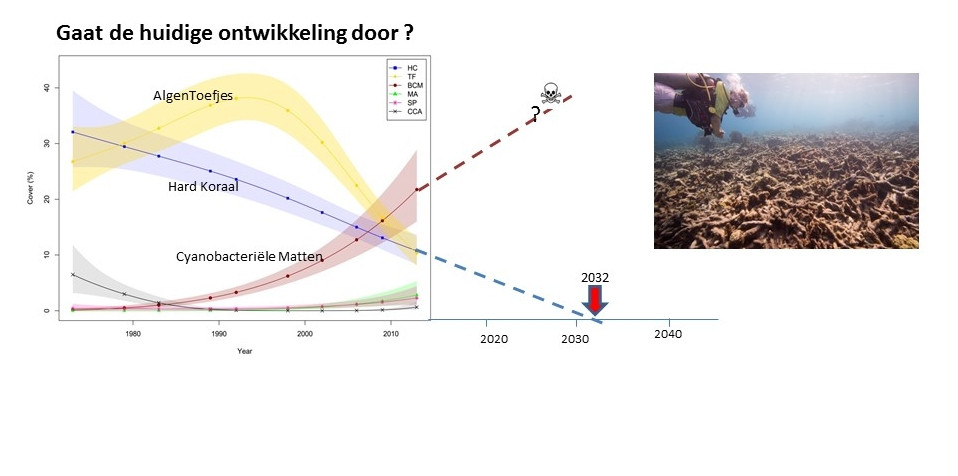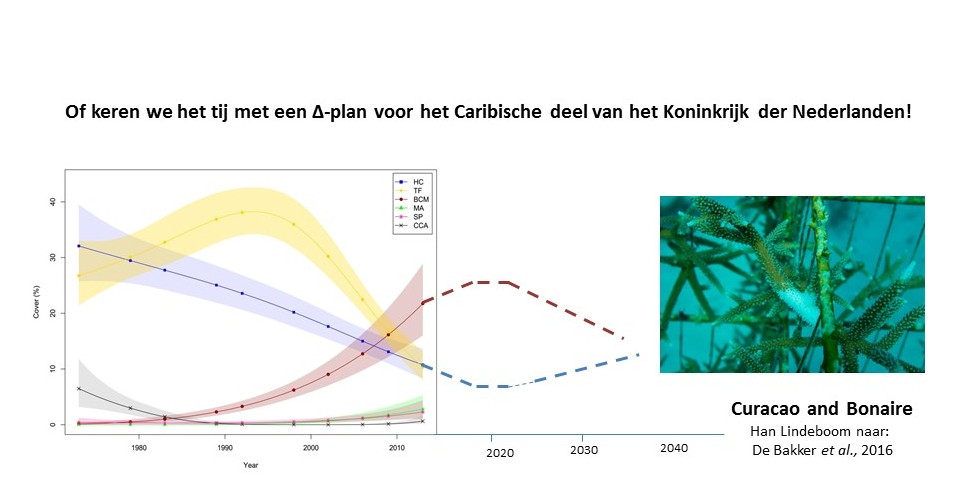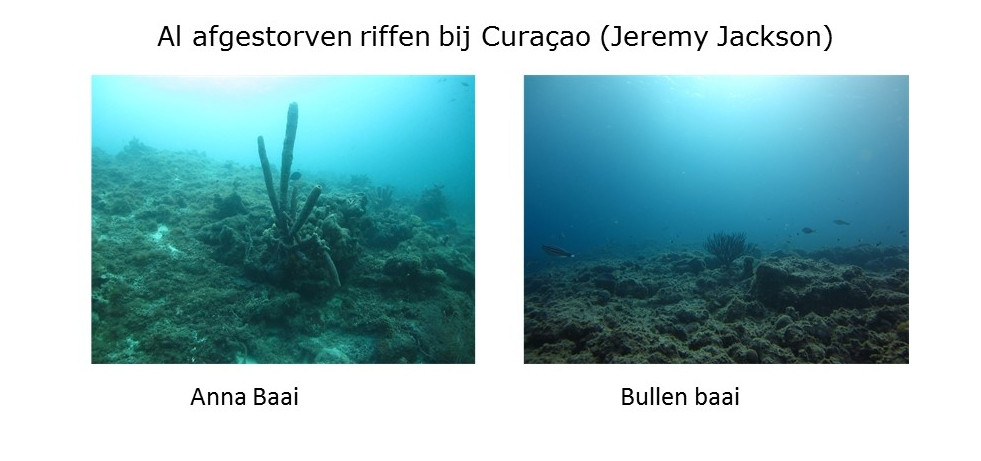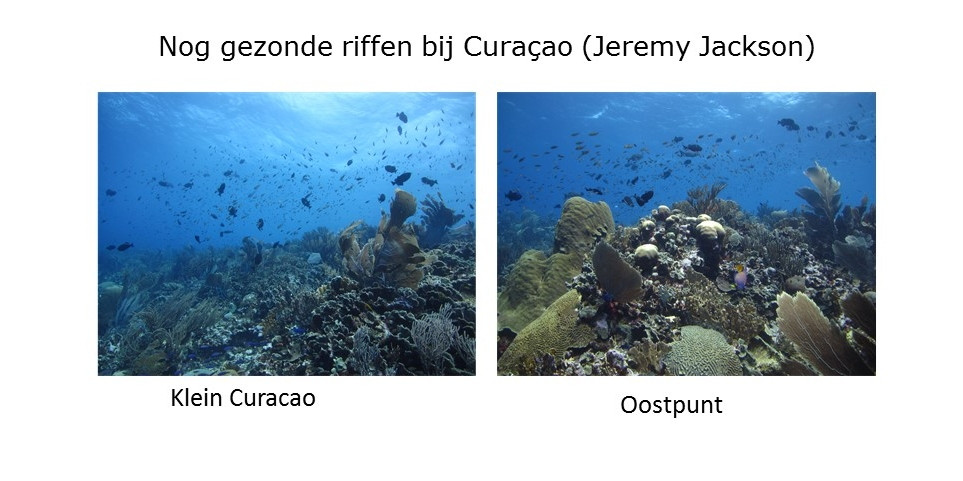Koraalriffen van de Nederlandse Antillen gaan binnen 15 jaar verloren
English translation below Dutch text
Tijdens een bijeenkomst op het Paleis op de Dam van 6 december 2016 stelde prof. Jeremy Jackson (Smithsonian en Scripps, USA) op basis van uitvoerig onderzoek dat het zo slecht gaat met de koraalriffen, dat deze bij ongewijzigd beleid en beheer over ongeveer 15 jaar geheel verdwenen zullen zijn. Oorzaken zijn: overmatige aanvoer van voedingsstoffen vanaf het land (eutrofiëring), erosie, overbevissing, verkeerde vormen van kustontwikkeling, vervuiling, introductie van gebiedsvreemde soorten en klimaatverandering.
Gealarmeerd door deze conclusies bezocht de Nederlandse deskundige Prof. Dr. Han Lindeboom (Universiteit Wageningen en NIOZ) daarop tussen 20 februari en 6 maart alle zes Caribische eilanden van het Koninkrijk en peilde daar de bereidheid van de verschillende Gouvernementen, Nationale Parken en andere belanghebbenden om mee te doen aan een Δ-plan voor het redden van de koraalriffen.
Noodzakelijke elementen zijn:
- Zeer ver terugdringen van eutrofiëring van de zee; met minimaal dezelfde maatstaven als in Europa gelden, maar bij voorkeur een reductie tot nul;
- Door land- en kusterosie en ondoordacht gebruik van de rivierdalen komt er te veel slib op de koralen. Dit dient zo sterk mogelijk te worden teruggedrongen, met maatregelen die ook noodzakelijk zijn voor de veiligheid van de bewoners;
- Klimaatverandering vormt ook in het Caribische gebied een grote bedreiging. Het Nederlandse klimaatprogramma moet ook daar uitgerold worden;
- Veel betere afvalverwerking, de huidige afvalverwerking is ver beneden het gewenste niveau waardoor er grote milieurampen dreigen;
- Voor herstel van de vispopulaties die de koralen onderhouden en visserij dient een programma “Breng de grote vissen terug en bestrijd exoten” uitgevoerd te worden.
Gewenste politieke en bestuurlijke acties
In de gesprekken hierover hebben vertegenwoordigers van alle eilanden aangegeven mee te willen doen met zo’n Δ-plan omdat iedereen inziet dat NU handelen absoluut noodzakelijk is. Het Δ-plan, waarbij het Griekse teken Δ (delta) ook staat voor verandering, moet bijdragen aan een adequaat natuur en milieubeleid, maar het plan moet veel meer beogen dan het redden van de koralen. Het kan ook voor langere termijn de economieën sterk verbeteren, omdat het toerisme een belangrijke motor van de Caribische economieën is en veel werkgelegenheid biedt. Als de koraalriffen verdwijnen gaan de eilandeconomieën ten gronde. De dan sterk stijgende werkloosheid en armoede zal ook gevolgen hebben voor Nederland. In het nieuwe regeerakkoord moet daarom worden gesteld dat de Koninkrijksregering een Task Force in gaat stellen om de grote problemen verder in kaart te brengen, oplossingen aan te dragen en deze te implementeren. Hiervoor is een bedrag nodig in de orde van een miljard euro, verdeeld over de komende 10 jaar”. (Voor details zie bijlagen.)
/////
Meer informatie/ more information
- Prof. Dr. Han Lindeboom, Email: han.lindeboom@wur.nl
----------------------------------------------------------------------------------------------------------------------------------------------------
English:
Coral Reefs in the Dutch Antilles will disappear within 15 years
On the six Dutch Kingdom-related Caribbean Islands, the coral reefs are in great danger of disappearing completely within the coming 15 years. When this happens, a major part of the island economies will also collapse. It is urgently needed that the newly formed Dutch Cabinet creates a Delta Plan to prevent such a disaster.
During a meeting at the Royal Palace in Amsterdam on 6 December 2016, Prof. Jeremy Jackson (Smithsonian and Scripps, USA) suggested that, based on extensive research, the coral reefs in the Caribbean are in such a bad state that they will completely collapse and be replaced by slimy algae in around 15 years, as long as policy and management remains unchanged. Causes include: excessive inputs of nutrients from land (eutrophication), erosion, overfishing, wrong forms of coastal development, pollution, introduction of invasive species and climate change.
Alerted by these conclusions, the Dutch specialist Prof. Dr. Han Lindeboom (University of Wageningen and Royal Netherlands Institute for Sea Research (NIOZ)) visited all six Caribbean islands of the Kingdom between 20 February and 6 March, and investigated the willingness of the various Governments, National Parks and other stakeholders to participate in a Δ-plan to save the coral reefs.
Essential elements are:
- Massive reduction in fertilization of the sea; applying at least the same standards as in Europe, but preferably reduction to zero-emissions;
- Due to land and coastal erosion and improper use of the river valleys, too much mud covers the corals. It is essential to reduce this as much as possible, the measures to take are also necessary for the safety of the inhabitants;
- Climate change also forms a major threat in the Caribbean. Thus, the Dutch climate program must also be applied there.
- Improvement of waste disposal systems. The current practice is far below the desired level, whereby major disasters threaten the environment;
- For the recovery of the fish populations that are of crucial importance to the health of the reefs as well as for the fisheries, a program “Bring back the big fish and remove exotics” must be executed.
Desired political and administrative actions
In the discussions on this subject, representatives from all the islands indicated their desire to participate in such a Δ-plan because everyone is well aware that it is absolutely necessary to do something NOW. The Δ-plan, whereby the Greek character Δ (Delta) also stands for change, must contribute to an adequate nature and environmental policy, but the plan must also have a much wider aim than just saving the corals. On the long term, it should also greatly improve the economy, because tourism is THE key driver for the Caribbean economies and provides the majority of jobs. Thus, if the coral reefs disappear, the island economies will also collapse. The then soaring unemployment and poverty will also have consequences for the Netherlands. That is why the new coalition should announce that the Kingdom government will establish a task force to identify the major problems, propose solutions and implement them. An amount in the order of a billion Euros, spread over the next 10 years is necessary to achieve this (for details, zie bijlagen).
Figure caption: Measured long-term trends for the developments of hard corals, algae and cyanobacteria.



